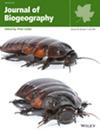An Ecoinformatic Model Using Rényi's Entropy Predicts Soil Chemistry Effect on Tree Species Abundance Distributions
Abstract
Aim
An ecological community consists of species of various abundances that reflect their responses to the environmental conditions. A classic macroecological pattern, the species abundance distribution (SAD), has been studied for diverse taxa and communities and integrated into numerous modelling tools. Despite its widespread use, a mathematical model that can capture variations in the empirical SAD and describe its response to environmental changes is still lacking. By integrating the Maximum Entropy Theory of Ecology (METE) with a generalised entropy called Rényi's entropy, we aim to develop a new ecoinformatic model that can predict the variation of empirical SAD along multiple environmental gradients.
Location
Panama.
Taxon
Angiosperms.
Methods
We extend the METE using the Rényi's entropy as an uncertainty measure. We apply this extended METE, called Rényi model, to the tree abundance data from 49 plots in Panama and predict the SAD within each plot. We estimate Rényi's parameter q by fitting the predicted SAD to the empirical SAD in each plot. We further compile climate and soil data from the Panama plots and analyse their relationships with the estimated q using multiple regressions.
Results
Rényi model provides adequate description of the empirical SADs and outperforms lognormal or log-series models in 40 of the 49 tree plots, according to the Akaike information criterion. Variations in Renyi's q estimates (from 1/2 to 1) reflect shifts in the empirical SADs. Multiple regressions reveal that P, Al and NH4, three soil chemicals that are important for tree growth and species distribution, significantly affect Renyi's q across plots.
Main Conclusions
These findings suggest that the Rényi model and Rényi's q can characterise the SAD of communities under environmental changes. They also indicate the potential of using generalised entropies to predict macroecological patterns in stressed ecosystems.

 求助内容:
求助内容: 应助结果提醒方式:
应助结果提醒方式:


